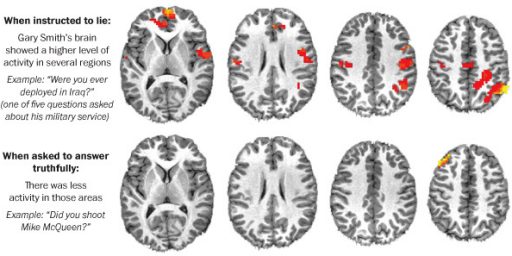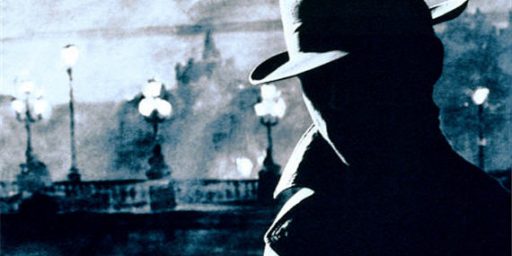Intelligence Polygraphs Controversial
Ruining the careers of sixteen percent of the innocent workforce strikes me as too high a price for catching eighty percent of the spies.
Dan Eggen and Shankar Vedantam have an interesting piece fronting today’s WaPo on the controversial nature of polygraphs as used by the American intelligence community in employee screening.
The CIA, the FBI and other federal agencies are using polygraph machines more than ever to screen applicants and hunt for lawbreakers, even as scientists have become more certain that the equipment is ineffective in accurately detecting when people are lying. Instead, many experts say, the real utility of the polygraph machine, or “lie detector,” is that many of the tens of thousands of people who are subjected to it each year believe that it works — and thus will frequently admit to things they might not otherwise acknowledge during an interview or interrogation.
Many researchers and defense attorneys say the technology is prone to a high number of false results that have stalled or derailed hundreds of careers and have prevented many qualified applicants from joining the fight against terrorism. At the FBI, for example, about 25 percent of applicants fail a polygraph exam each year, according to the bureau’s security director.
[…]
In settings in which large numbers of employees are screened to determine whether they are spies, the polygraph produces results that are extremely problematic, according to a comprehensive 2002 review by a federal panel of distinguished scientists. The study found that if polygraphs were administered to a group of 10,000 people that included 10 spies, nearly 1,600 innocent people would fail the test — and two of the spies would pass. “Its accuracy in distinguishing actual or potential security violators from innocent test takers is insufficient to justify reliance on its use in employee security screening in federal agencies,” the panel concluded.
[…]
But even critics of the polygraph concede that it can help managers learn things about employees that would otherwise remain hidden. That aspect of polygraph testing lies at the heart of its continuing appeal, said Alan Zelicoff, a former scientist at Sandia National Laboratories who quit because he believed that polygraphs are unethical.
[…]
The subjective opinions of polygraph examiners play a huge role in whether people are said to pass or fail, said William Iacono, a psychologist at the University of Minnesota who has extensively studied the technique. As evidence, Iacono said that polygraph tests rarely find problems among senior staff members at organizations, even as 30 to 40 percent of applicants for entry-level positions fail.
Ruining the careers of sixteen percent of the innocent workforce strikes me as too high a price for catching eighty percent of the spies.
My view is undoubtedly tainted by having been among the false positives a few years back after offered a position as an FBI counterintelligence analyst. I was unable to dissuade an examiner from his view that I was being evasive on his questioning as to whether I had ever sold illegal drugs, despite the test being Yes/No, answering No, and not having ever sold, purchased, or otherwise been affiliated with illegal drugs.
The process is truly bizarre and I have spoken with a fair number of intelligence community employees who have either failed polygraphs or refused employment offers by other agencies on the grounds that they were unwilling to place their careers in the hands of a polygraph operator.
Update: Regular commenter DC Loser, an intelligence professional, recommends retired CIA officer Larry Johnson‘s post on this which observes,
Most of my friends in the intel community believe it only works against folks who have a conscience and a strongly developed sense of right and wrong. Important to remember that the traitor, Aldrich Ames, passed the polygraph even though he had sold his soul to the Soviets.
True enough. Most of the post consists of a letter from George W. Maschke, proprietor of an anti-polygraph website. It quotes John J. Furedy, a professor emeritus of psychology, as saying the polygraph “is virtually useless for differentiating the anxious-but-innocent person from the anxious-and-guilty one.”
Update 2: Elsewhere, Paul Mirengoff and Stephen Spruell dissent from the article without refuting it on the basis that it seems vaguely favorable to Mary McCarthy and is thus WaPo commie spin. Conversely, Melanie Mattson jumps on the story as evidence that “the Bushies are relying on a technology which only works once and a while and by accident? This sounds like something the anti-science crowd would appreciate.” But McCarthy can simultaneously be guilty and the polygraph not a particularly good tool for distinguishing truth tellers from liars. And, while I disagreed with the use of polygraphs in this manner long before I ever took one, the Bush administration didn’t initiate their use for this purpose.
Michael Tanji calls the poly a “voodoo box” and tells us,
A good friend effectively wasted four years in the military because he couldn’t “pass” a poly. Nothing wrong with him, he just didn’t take to the box. A well-known and distinguished former Commander apparently passed only one out of several in a 20+ year career. Did we catch a spy in one case and miss one in another? Not likely, because a botched poly is supposed lead to a more thorough investigation, the findings of which should support or refute any discrepancies in what the voodoo box says. The high-performing and highly-regarded officer got his investigation; the apparently shady Private did not. It’s a numbers game: there are plenty of Privates to go around.
True enough. It stands our system on its head, questioning people with no probable cause and then, when given a positive result, putting people in the position of having to prove their innocence. Usually, that’s not possible. Indeed, they’re typically not given a chance.






See Larry Johnson’s piece in the TPM Cafe today, and go visit antipolygraph.org for some more information. I have been through a few polys, and probably will for a few more times in my career. I have been through one that was as described in the WaPo, which was basically a fishing expedition. The other I have had was done professionally. That said, I personally believe that polys are good at catching people who are very honest (that is, they sweat about everything), and the pathological liar will breeze right through. I don’t think they are accurate in ferreting out the wrongdoers because they catch too many who are totally innocent. But I don’t see the government moving to another system of security vetting anytime soon.
I agree that they serve a good purpose.
And anyway…after Mary McCarthy supposedly failed a polygraph test, didn’t she ADMIT to leaking the information?
We’ve known for well over a half-century now that polygraphs don’t really work at all, and people are still using them.
Here’s a rule of thumb: if your potential employer requires a polygraph test before you can start the job, run – don’t walk – away from there. It’s going to be a sorry place to work, and the polygraph test will just be the first of many really stupid and arbitrary hoops to jump through.
The CIA is full of corrupt leakers. Its time to go after them with everything we have. If there is a better way to weed out the fifth column then fine, use it. Its time to clean house and anyone who can’t pass a lie detector test should go.
RA, I would like the leakers to be caught and crushed as much as anyone, but the whole point of this is that the poly won’t catch many who are and will ruin others who aren’t. The tool is simply no good. Worse than no good, in fact.
I submit the reason that polys still hang around is at least partly due to the strange American obsession with being able to measure things. The poly gives a strong illusion of providing a capability to measure truthfulness, even though in reality of course it can’t, and probably no device can with any reasonable accuracy. But the comfort of the illusion trumps the uncomfortable acknowledgement that a person’s truthfulness can’t be measured and counted, combine this with typical bureaucratic inertia and blockheadedness and thus we are stuck with the voodoo box.
The problem is that the poly is supposed to be just one tool in a whole set for catching ‘bad guys’. But it’s become some kind of universal widget that isn’t questioned anymore – system goes squiggly? Out the door you go – no questions asked, no appeal.
I’m not sure I understand the math. Of 10,000 who take a polygraph, 16% will generate false positives — look guilty when they’re actually innocent.
If those 1,600 are subjected to a second polygraph, then the number of false positives that will be generated is 256. If those 256 receive a third polygraph, 41 will generate a false positive. On the fourth round of testing, only 7 of the original 10,000 will show guilt where none exists. 7 false positives out of 11,896 tests is getting close to accurate.
One commenter on another blog correctly observed that polygraphs have not improved their accuracy in 40 years, while everything else has become super accurate and super fast. It’s almost like weather forecasting. Weather models still give only a five-day forecast but in the last decade the cost of computing horsepower to crunch the data has fallen through the floor.
Polygraphs and Cat 5 hurricanes: each still a mystery in our free and open society.
J.M.,
The problem is that the polygraph may be measuring something, most likely the anxiety of the victim. That anxiety isn’t going to decrease on a second polygraph, or a third, or fourth, no matter how innocent the victim. Furthermore, I’d wager that a polygrapher is more likely to find deception if he knows he is looking at a repeat polygraph, no matter what the wiggles actually say. The interpretation is too subjective.
There is evidence that, the more intelligent the victim, the more likely the polygraph will produce a false positive. This is a real problem at places like the national laboratories, where intelligence is a sine qua non.
I have heard first-hand accounts of how the interpretation of a polygraph mysteriously changed once the victim retained a lawyer knowledgeable about polygraphy. Except it’s not so mysterious.
I say be done with the d*** things. If I’m going to hold a clearance, I’m willing to accept the fact that the government is going to periodically rifle through my bank account and closely question my family and neighbors about me. If I’m going to work in an exclusion area, I’m willing to accep the fact that the government can bug my phone, computer, and office space at any time without a warrant. But I don’t want my fate hanging on a charlatan’s interpretation of wiggles on a graph — especially since fear of the charlatan actually increases the likelihood he will incorrectly interpret those wiggles as deception. It’s like telling a kid that the big dog will only attack if it senses fear. Yeah, right … great way to ease the kid’s fear.
I’m guessing the bottom line is that polygraphy is a lot cheaper than the kind of careful field investigation that actually works. Otherwise, it would have been abandoned long ago.
Kent gets it exactly right, I think.
In my own case, I suspect the very thing they were trying to hire me for–my analytical ability–was the thing that caused me “problems” on the poly. There are damned few questions to which I unreservedly answer Yes or No. My brain just doesn’t work that way.